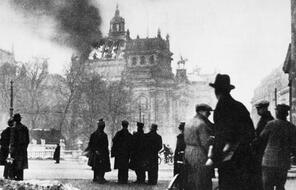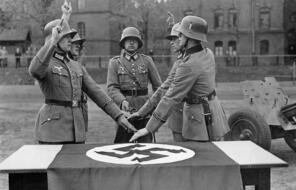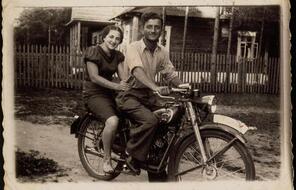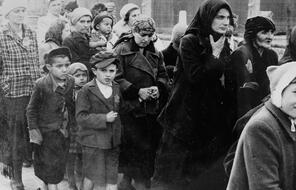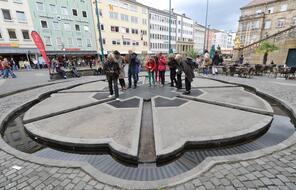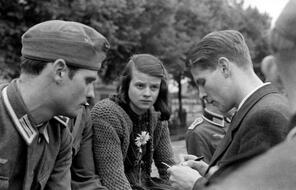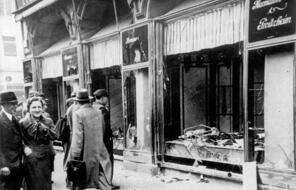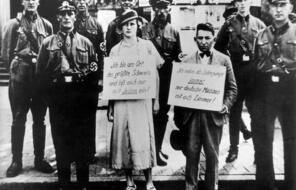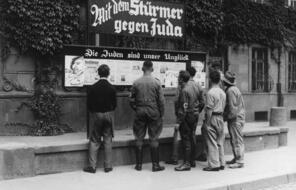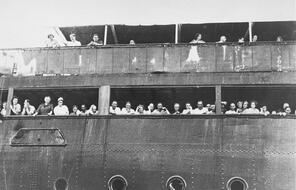“An Algerian Muslim’s Memories of Internment”
At a Glance
Language
English — USSubject
- History
- Social Studies
- The Holocaust
The following excerpt is from the diary of Mohammed Arezki Berkani, an Algerian Muslim who was imprisoned by the Vichy government in 1941 for his anti-colonial activities. He was sent to a labor camp in the Algerian Sahara called Djéniane Bourezg, and he wrote about daily life in the camp. In this selection, he focuses on the role of an oppressive camp overseer named Deriko, and he highlights how he and his fellow inmates respond to Deriko’s actions.
Deriko tried to foment trouble. From our arrival in Djenien-Bou-Rezg, the Muslims in the first section prayed together at the times prescribed by our religion. The muezzin 1 , one of us internees, would recite the call to prayer for the faithful. Singing the call out loud provided the added bonus of informing the detainees in the second section of the time for prayer.
One day Deriko arrived at Maghrib (evening prayers). He told us that from that day forth, it was forbidden to sing the call to prayer. He said:
“I forbid your prayers: you are anti-French and you pray against France.”
He called the goumiers 2 , yelling:
“To arms, to arms!”
We Muslims did not respond, preferring to first finish the prayer that we were in the middle of, in compliance with the opinion of Imam Hadj El-Hocine Slimani.
He declared:
“We die praying, like those who died before us.” We were thus in the process of praying when the goumiers arrived, in a rush, rifles and bayonets in hand. They entered the first section. We were doing our prayers in pious silence right at the entrance.
I think that the goumiers must have thought to themselves, “Commander Deriko is crazy.” Be that as it may, he and the goumiers waited for us outside the section. Deriko told them to bring the person who had recited the call to prayer to his office. As for us, we unanimously decided that the Muezzin El-Ghazi, who recited the call, must be accompanied. Furthermore, he was a blind internee. The imam asked the believers:
“Who wants to accompany El-Ghazi?”
He was afraid, as he was father of three children. I told El-Ghazi that he mustn’t be afraid in these circumstances, which did not concern just him, but which were everyone’s business. After a short moment of silence, Djaker Ali, an internee, spoke up to say that he was ready to accompany him. It was a gesture of noble courage, but Djaker was young and would perhaps not know how to answer questions. So, it was I who accompanied him. Indeed, I took El-Ghazi by the arm, and the practicing Muslim internees encouraged us, saying that they were all behind us and that no one would abandon prayers. We entered Deriko’s office. He repeated his order:
“You must not sing prayers.”
Deriko is neither intelligent nor educated. He knows only the switch, the whip, torture, etc. I offered him explanations, informing him that we do not sing prayers, we only sing the call to prayer, the call for the faithful to pray together; that we have been there for over fifteen months and no commander had prevented us from praying. Deriko called his secretary and questioned him about Muslim prayers. The secretary responded poorly, and I found myself obliged to add a few words. . . .
We left his office without obtaining anything. I summarized the interview for the Muslim brothers of our section, who decided to continue with religious observance as had been done in the past. The next day at dawn, a new man sang the call, instead of the one who usually did so.
Before eight o’clock in the morning, Deriko showed up. If I remember correctly, it was a Sunday. The internees did not work. Immediately, he called the head of the section to find out who had made the call to prayer. He put both the section head and the man who had actually sang the call for prayer in cells. But commander Deriko was supremely mistaken this time. He believed that, by putting faithful internees in cells, he would succeed in dissuading us from practicing our religion and our duty to pray. But the entire Muslim section is like one single man and we decided once and for all to prefer death to abandoning our religion.
Each faithful took his turn calling for prayer and was brought to a cell. The cells were full, and at each prayer time, there was always a good-willed internee who did his duty, meaning that we continued singing the call to prayer. For about two weeks this repression continued. Finally, it was not the Muslims who gave up, but Deriko who abandoned his policy and released the militants.
This was not all. He was always searching for new ways to create problems between internees. He demolished a wall that separated the first section [of the camp] from the second section and added four or five rooms to the first section. These rooms had belonged in the past to the second section.
There, he assembled the camp’s Jews, who had previously been mixed in with the Europeans, and separated them from the French, or rather, from the Europeans. This wretched Deriko was responsible for yet more provocations. The Europeans to one side, the Arabs to one side, same for the Jews. The latter again share the first section. The same courtyard serves both Muslims and Jews. There was no doubt: Deriko did this with the intention of seeing Jews slaughtered by Muslims, since there were not many Jews. But, the Jews understood his scheme. So did the Arabs. Commander Deriko wanted Arabs and Jews to stab one another, but the opposite occurred. A friendly understanding spread between the two communities. Never would you have believed that the Arabs and the Jews in the camp’s first section would become real friends, even brothers. Indeed, whether they wanted it or not, they were brothers in hunger, suffering, misery, sorrow, etc. in Deriko’s camp. . . .
I would like to conclude simply by paying homage not only to the Muslim militants, and in particular to the organizers, but also to the Jews who knew how to thwart all of Deriko’s and his deputy’s petty attempts to provoke incidents among Arabs and Jews. . . . 3
- 1The person who calls Muslims to prayer.
- 2 Indigenous Moroccan soldiers.
- 3Stein, Sarah Abrevaya, and Aomar Boum. “Berkani, Mohammed Arezki. Trois années de camp: Un an de camp de concentration, deux ans de centre disciplinaire, Djenien-Bou-Rezg, Sud Oranais (1940 à 1943 Régime Vichy). Koudia-Sétif, Algeria, 1965. Translated from French by Rebecca Glasberg.” Essay in Wartime North Africa: A Documentary History, 1934–1950 (Stanford, CA: Stanford University Press, 2022).
How to Cite This Reading
Facing History & Ourselves, “An Algerian Muslim’s Memories of Internment,” last updated June 30, 2023.
This reading contains text not authored by Facing History & Ourselves. See footnotes for source information.

